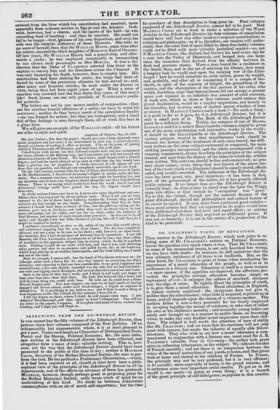SELECTIONS FROM THE EDINBURGH REVIEW.
1.7 you cannot buy the fifty volumes of the Edinburgh Review, then procure these four volumes composed of the Best Articles. Of an indispensable but unprocurable whole, it is at least pleasant to get a part. Under such heads as Characters of Distinguished Poets, Poetry and the Drama, Political Economy, 84c., the most elabo- rate articles in the Edinburgh Review have been collected, and altogether form a mass of most valuable writing. This is, how- ever, not the way that the Edinburgh Review should have been presented to the public at this time of day ; neither is MAURICE CROSS, Secretary of the Belfast Historical Society, the man to per- form the task. He has prefixed a Preliminary Dissertation,—which, if it had been required at all, should at least have been a philo- sophical view of the principles of the Edinburgh Review in all its departments, and of the effects its advocacy of them has produced. MAURICE, however, though perhaps great in preparing prose for the Belfast Historical Society, sadly wants reach of mind for an undertaking of this kind. No doubt he balances Johnsonian commonplaces with an air of much self-importance; but the time for quackery of that description is long gone by. Four volumes composed of the Edinburgh Review, cannot fail to be good. Had MAURICE CROSS set to work to make. a • selection of the Worst Articles in the Edinburgh Review, his four volumes of compilation would have still beat any other modern's original contributions to criticism and philosophy : as it is, therefore, our readers will under- stand, that the cubic foot of space filled by these four bulky volumes could not be filled with more valuable periodical matter—no, not if MAURICE CRoss, like Sinbad, had thrown his beef every day for a year into the Valley of Diamonds, and heaped into one large mass the treasures thus derived from the affinity between ox flesh and precious stones. Were a man bound for a residence in the South Seas, and in the act of selecting his library, how many a longing look he would cast upon the ranging row of the Edin- burgh ! how he would calculate its cubic inches, guess its weight, and, probably, end after all in consigning it to a couple of tea- chests, in spite of the expense of freight, the grumbling of the captain, and the objurgation of the fair partner of his cares, who would, doubtless, urge that bonnet-boxes did not occupy a greater space and rejoiced in an infinitely less amount of solid contents. A• book now, which in three or four volumes could replace this grand desideratum, would be a mighty acquisition, not merely to the traveller, but to every man of limited means whether of time or money. Is MAURICE CROSS'S such a book ?—No such a thing: it is good as far as it goes, for it is Edinburgh Review, but it is only a small part of .it. The Book of the Edinburgh Review must be a different thing. 'Within the compass of one of Messrs. LONGMAN and Co.'s octavo Encyclopmdia volumes, might be given' one of the most entertaining and instructive works in the world : it should be the Encyclopredia of the Edinburgh Review. The various subjects treated in that miscellaneous work should be classed, the history of the treatment of each class traced, the diffe rent writers on the same subject contrasted or compared, the more striking passages incorporated, and the whole accompanied with a running commentary, drawn first from the principles of the subject treated, and next from the history of the times in which the articles were written. The criticism should be free and unreserved; no pru- dery about names; every thing that was known of the secret his- tory of the work which was illustrated should be openly stated, effects noted, and results recorded. The influence of the Edinburgh Re- view has been great, nay, most important,—it has been in fact, part of the government of the nation, for it has greatly affected public opinion. It no longer does so—the Edinburgh Review is virtually dead; its demise may be dated from the hour the Whigs came into office; at that instant its "occupation" 'was "gone." Up to this the virtual, though not the nominal decease of the great Edinburgh, should the philosophical and critical history of its career be carried. It may since have contained good articles— these good articles had they not appeared in its pages would have been published elsewhere and have had equal effect ; as articles of the 'Edinburgh Review they acquired no additional power. It was not so formerly ; it is not in the nature of a production of the kind to be perennial.




















 Previous page
Previous page